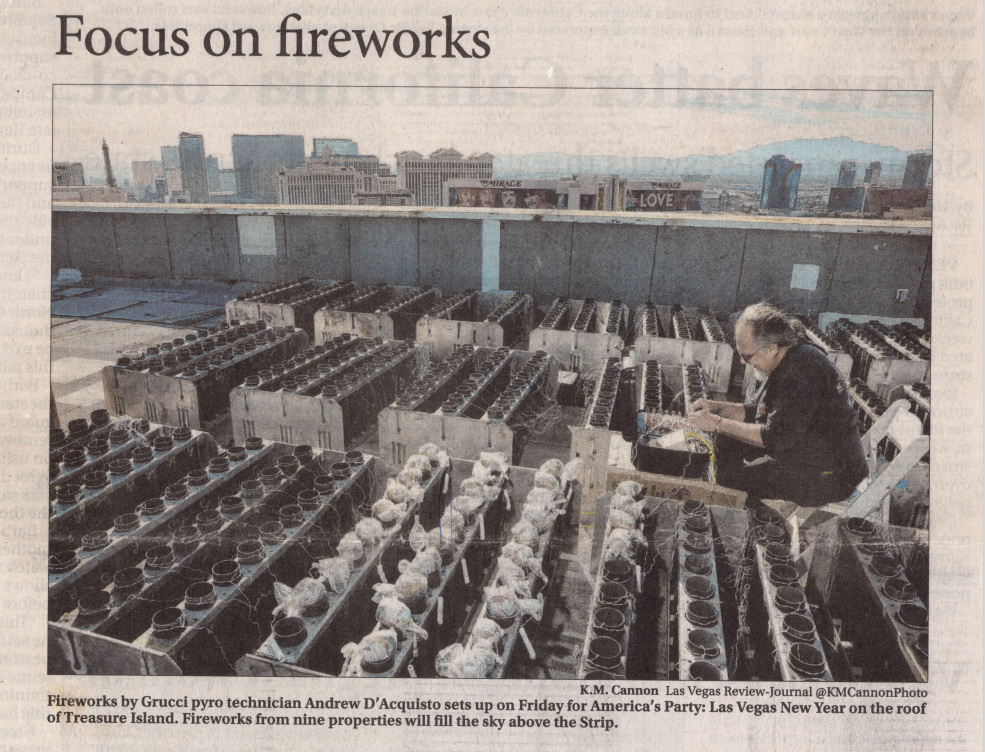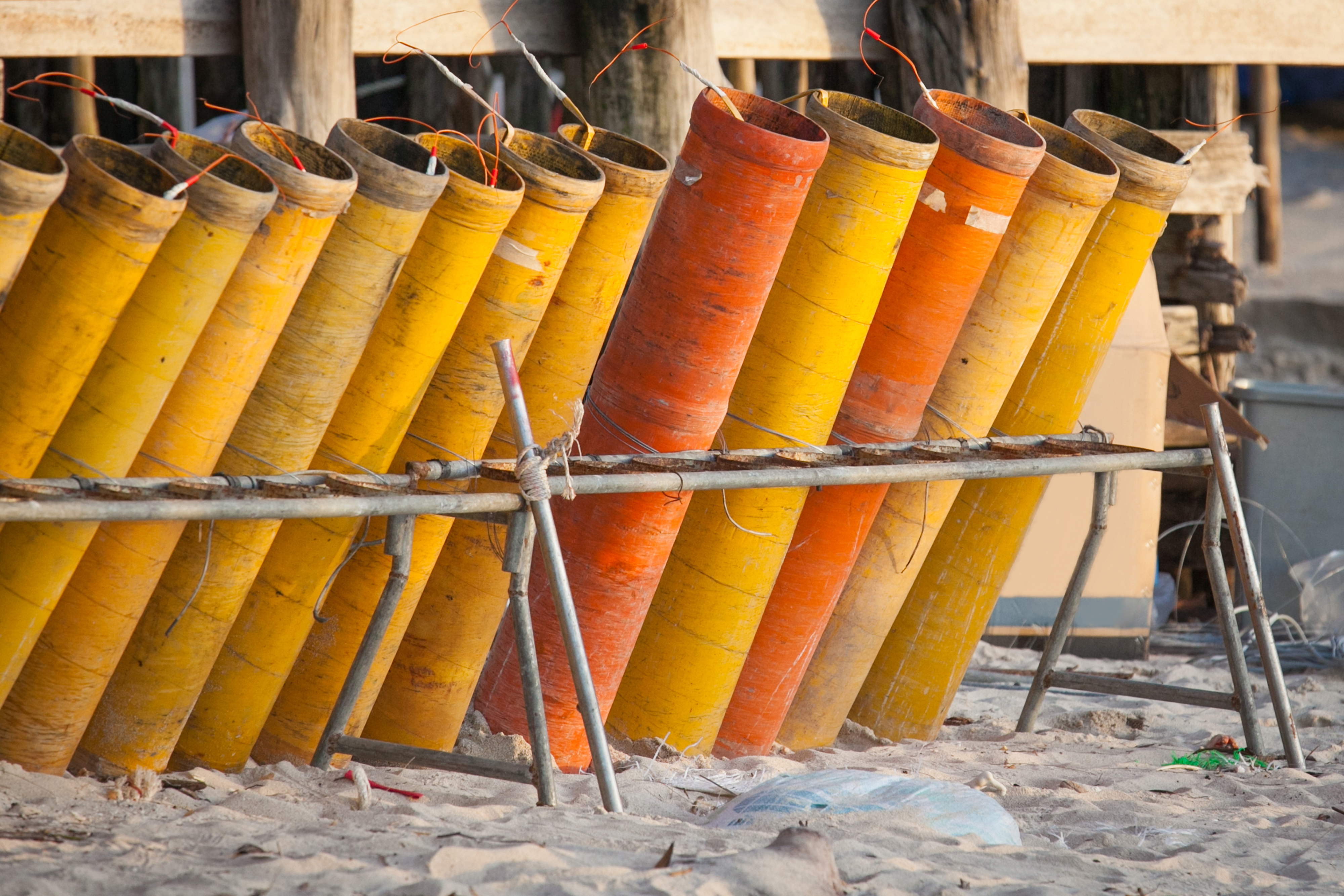
While pyrotechnics may have Chinese roots, the colorful fireworks we have today came from Italy. Starting in the 1830s, Italians combined metals and explosives to develop vibrant sky spectacles. That led to the birth of Italian family fireworks businesses, such as Zambelli and Fireworks by Grucci, America's largest and oldest pyrotechnics-production companies.
Arkansas resident Andrew D'Acquisto, who has family in Porticello, Sicily, has worked with fireworks for about 40 years. We sat down to chat about how the pyrotechnician got started and what happens behind the scenes during your typical fireworks show.
How did you get started with fireworks?
I was interested in working with them and just didn't know how to get a job in particular. And so I asked people who I saw. People I asked had gotten started through their family or friends of their family. I started going to the fireworks convention and asking people, and it was the same; they'd either been through this family or knew someone next door that the family knew.
Then I got a copy of American Fireworks News, a newsletter about fireworks in particular, and they had ads and people buying and selling stuff in the back pages. There was an ad from the Grucci family looking for some help, which was surprising. A well-known name. It would be like if you were a guitar player and saw Bob Dylan advertising for "Extra Musician" or something. But they had gotten a contract one year and had a lot of little shows to do. So they were hiring extra people. At that time, I was in Arizona and drove up to see them in the springtime. They had a training session and a little show we did at a church for practicing, followed by some classes.
They started calling me, maybe once or twice a year, on the 4th of July. Sometimes, they started on New Year's. The first job I did was in Florence, Alabama.
But then I did a job down in Little Rock. It was near Memorial Day, and it happened to be their grandfather's 80th birthday, so a lot of the family came down for that. We had a cake and a small get-together after the show.
I just started working for them, and I've traveled to different parts of the country and world with them, including Dubai and Riyadh, Saudi Arabia, a couple of times.
What have you learned about Italian fireworks?
What you see normally are shells that are more round, which shoot out the mortars. Italian fireworks are long and layered. They call them salamis. Each section will go off, and then the bottom shot will go off. It's just a different style of making, hand-wrapping, and putting them together.
What goes on behind the scenes for a fireworks show?
The main thing is driving there because they're strict; you must have a commercial driver's license for whatever size truck you have. But then, when hauling the load of fireworks, the truck needs to have special placards on it, and then it needs to stop and get weighed and inspected.
We'll get to wherever we're going, and the first thing we'll do is unload most of the truck that's set up. There are racks of mortars, which are the pipes or tubes that shoot the fireworks out.
You unload those and then nail any racks together, set them up, and put legs on them to make sure they're at the right angle, going up and down, so they're not going to fall over and go towards an audience. So they're going to the sky.
Most jobs are electrical now. So first, you'd set up all the motors and then unload the individual boxes, and they're choreographed. We'd have a diagram of where we'd unload the boxes or troughs, put them where they needed to go, and load the shells into the mortars.
We attach a wire from each fuse with the leader, which would set it off because it is set off electronically. Those get wired into smaller boards, and the smaller boards get hooked into the cables. Then, the cables, depending on the size of the show, all get hooked into a box, and they're selected at the proper cue time. So the wires would run the distance to that main control box and then be wired into the proper sequence or the order they're supposed to go off.
Now, a lot of fireworks are set off and choreographed to music, so that number one will set off one or two or three that are supposed to go off at that time in time with the music. There are different tracks, but we lay those down and connect them all. That may take a day or two or even weeks for extra world-size performance, and then we run a test on everything to make sure everything was hooked up properly, that there are no missed cues, and that they're ready to go when we start the display.
That would often be tied to a computer or someone with headphones, so it would be a matter of laying everything out and connecting it.
It's a long time for, say, a half-hour show. It might take two or three days to set everything up like that, depending on the size. Now, some shows are set up on barges, so you'd have to load everything from the truck onto the barge and set that up the same way. Then, you have to set up communications, which include headphones or walkie-talkies, to keep in touch with everyone. And then get their orders to shoot in sequence.
So basically, we just set up the mortar stands, load them, and then ensure the igniters are hanging out. Then, we wire them to where they go to the control box, lay out all the cables, and connect all the cables.
How have fireworks shows changed?
Years ago, it used to be all hand-loaded. The first job I did was by hand. I worked with an older gentleman, and he was hard to keep up with!
Can you speak to the Italian tradition of fireworks?
They get together to celebrate religious holidays and those named after the church, such as St. Joseph's Day or St. John's Day, and then have their special feast. And they would mostly be hand-manufactured.
I met some Maltese people who would get together, and their church group had a little band. They'd practice their different instruments and be playing. Another group would get together, making and setting off the fireworks for the church's feast days. The whole town would come out because they're all from a single church in each town. They would celebrate the entire town, and people would come from all around to enjoy it. They did a lot of things, like hand-rolling paper tubes and wrapping them up with more paper and string.
What do you most enjoy about fireworks?
It's like hearing the song that makes you feel better. It lifts you up and makes your life easier. You appreciate it and share it with your neighbors.
With fireworks, it doesn't matter if your neighbors may not all be of the same tradition or speak the same language; they all share the same ooh and ahh or enjoyment of it. There's a spiritual uplifting when you can just look up to the sky and say, "Oh, we're in this all together."
If you enjoyed this article, consider subscribing to my newsletter for more content and updates!

